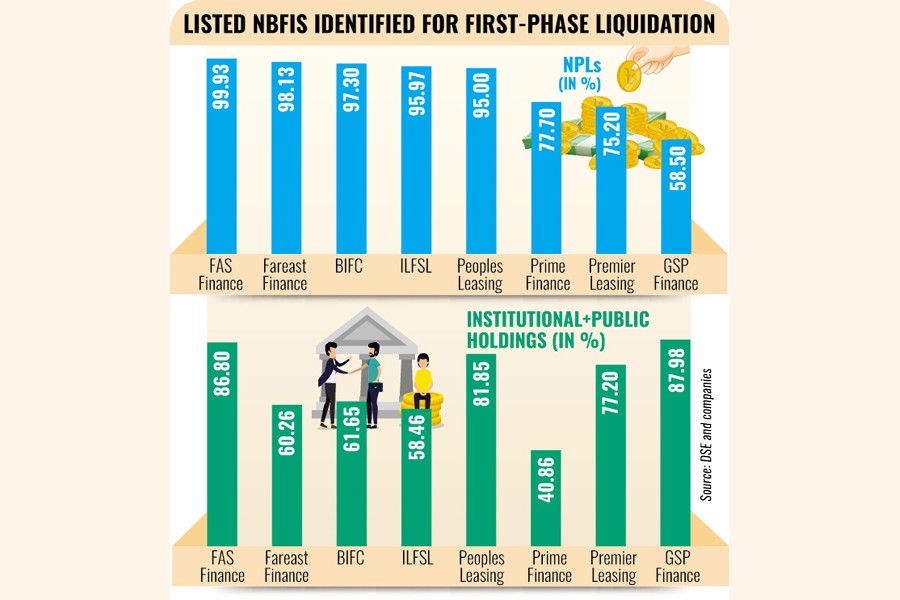Investors likely to return empty-handed from NBFI liquidation drive

Published :
Updated :

Investors are unlikely to recover anything from their stakes in the non-bank financial institutions (NBFIs) now heading for liquidation under a Bangladesh Bank initiative.
The central bank has recently decided to wind up nine out of 35 NBFIs in what marks the first such large-scale liquidation move in the financial sector, aimed at protecting depositors and restoring stability.
Of the nine, eight are listed on the stock exchanges. They are FAS Finance and Investment, Bangladesh Industrial Finance Company, Premier Leasing and Finance Limited, Fareast Finance and Investment Limited, GSP Finance Company Limited, Prime Finance, People's Leasing and Financial Services, and International Leasing and Financial Services.
These institutions had been crippled by years of irregularities, loan scams, and mismanagement under the previous government, leaving them unable to repay depositors upon maturity. Some directors were accused of large-scale embezzlement, further eroding public confidence in the sector.
Public and institutional investors together currently hold between 40.86 per cent and 86.8 per cent stakes in these companies, according to the Dhaka Stock Exchange.
Given their financial health, analysts say there is little chance of recovering any of that investment. High classified loans, negative capital adequacy, excess liabilities and years of losses have pushed the institutions into a position where their survival is no longer viable.
"General investors have hardly anything to hope for as they will come at the bottom of the priority list at the time of settling dues," said Akramul Alam, head of research at Royal Capital.
Under liquidation rules, external creditors are paid first, followed by depositors, debenture holders, and preferential shareholders-placing ordinary investors last in line.
Technically, most of these firms are bankrupt, with up to 99.9 per cent of their investments now classified. Their non-performing loan ratios range between 58.5 and 99.9 per cent, leaving large equity shortfalls that cannot be covered under normal circumstances.
Md Sajedul Islam, managing director of Shyamol Equity Management, said liquidation means permanently closing operations and selling off assets to repay liabilities.
"When the companies are failing to pay back their depositors, how will general shareholders get their investment back?" he asked. He pointed out that the asset base of these institutions is extremely poor compared to their liabilities.
"There is only option to get investors something if the government takes initiative to sell sponsor-directors' personal assets."
Mr Islam also called for punitive measures against those responsible. "We have been raising the alarm for the last few years. If action had been taken earlier, much of the current damage could have been prevented," he added.
The Bangladesh Securities and Exchange Commission (BSEC) has not yet been formally notified of the liquidation plan. "The stock market regulator will try to safeguard the interest of the general investors once the central bank informs us," said Abul Kalam, spokesperson of the BSEC.
He, however, declined to comment on whether shareholders would be able to recover any funds.
In the meantime, investors have already beendumping shares of the NBFIs. Last week, the stocks were among the top losers on the Dhaka Stock Exchange, shedding between 19 per cent and 33 per cent. Most now trade at prices far below their face value of Tk 10 each share, with some priced under Tk 2 each.
Bangladesh Bank Governor Dr. Ahsan H Mansur has assured depositors that their money will be protected but stressed that sponsor-directors must be held accountable for the collapse.
"We are moving forward with this only to protect the depositors," he said. The liquidation will be carried out under the Finance Company Act 2023, with the central bank applying to the High Court for approval and appointing liquidators once approval is granted.
The regulator estimates that dissolving these institutions could cost Tk 80-90 billion but considers it necessary to "clean up the industry."
Earlier this year, the central bank identified 20 weak NBFIs and issued show-cause notices. Nine were selected for liquidation after their responses were deemed unsatisfactory.
The financial distress, however, is not sudden. These institutions have long been plagued by poor governance and unchecked irregularities.
One glaring example is Prashanta Kumar Halder, former managing director of Reliance Finance and NRB Global Bank, who siphoned off more than Tk 35 billion from four NBFIs-People's Leasing, International Leasing, FAS Finance and BIFC-using fake documents.
babulfexpress@gmail.com


 For all latest news, follow The Financial Express Google News channel.
For all latest news, follow The Financial Express Google News channel.